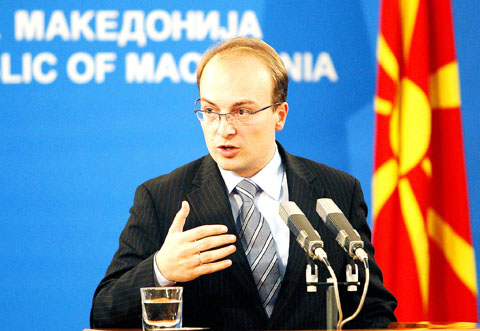Both Montenegro and Macedonia recognized Kosovo’s independence despite opposition from Serbia, which called the moves by its Balkan neighbors a betrayal and expelled the Montenegrin ambassador from Belgrade.
The moves represent a major blow to Serbia’s diplomatic efforts to maintain a claim over Kosovo, considered by Serbs to be the cradle of their Orthodox Christian religion and statehood.
Montenegro and Macedonia — both seeking membership in NATO and the EU — have been under pressure from the US and some EU countries to recognize Kosovo’s February declaration of independence. The two coordinated with one another in recognizing Kosovo on Thursday, Montenegro’s Foreign Minister Milan Rocen said.

PHOTO: EPA
“This is not a decision against Serbia, but for our future,” Rocen said.
The Macedonian foreign minister also suggested the move was inevitable.
“This is a move that corresponds with reality,” Antonio Milososki said. “We believe this [action] will not endanger our relations with Serbia.”
Serbia had threatened unspecified retaliatory measures if the two countries recognized Kosovo, which Serbian Foreign Minister Vuk Jeremic said earlier would be “a stab in the back.”
After Montenegro’s recognition on Thursday, he said the country’s ambassador “was no longer welcome” in Belgrade.
It was immediately unclear if Serbia would expel any diplomats from Macedonia, which announced its recognition of Kosovo several hours after Montenegro.
Jeremic said Montenegro’s move was a particular betrayal, given that the country was both a close ally and a neighbor. Montenegro split from Serbia only in 2006, and its officials sided with Serbia during the region’s ethnic wars in the 1990s. However, pro-Serb officials are not a part of the current government in Montenegro, a tiny Adriatic Sea state almost equally split between Montenegrin and pro-Serb nationalists.
Jeremic said the recognition jeopardized regional stability and amplified fears that tensions could be reignited.
“Regional countries have special responsibility in preserving peace and stability in the Balkans,” Jeremic told the state-run Tanjug news agency.
Macedonia, which gained independence in 1991, was the 50th UN member country to recognize Kosovo. The recognition had been complicated by a border dispute, but the two sides say they are close to reaching a deal.
Meanwhile, Serbia won a diplomatic struggle on Wednesday with the UN General Assembly agreeing to ask the International Court of Justice for an opinion on the legality of Kosovo’s declaration of independence.
Serbia said on Thursday it was reinstating its ambassadors to the US and countries including Japan, Canada and Australia that had recognized Kosovo’s independence earlier this year.
Belgrade had already returned its ambassadors to 22 EU nations in July.
Serbia said it was reinstating the diplomats because of “continued diplomatic activity to preserve its territorial integrity and sovereignty.”
Serbia has not had effective control over Kosovo since 1999, when NATO led air strikes that halted former Serbian leader Slobodan Milosevic’s crackdown on ethnic Albanian separatists. For years, it was administered by both NATO and the UN.

Polish presidential candidates offered different visions of Poland and its relations with Ukraine in a televised debate ahead of next week’s run-off, which remains on a knife-edge. During a head-to-head debate lasting two hours, centrist Warsaw Mayor Rafal Trzaskowski, from Polish Prime Minister Donald Tusk’s governing pro-European coalition, faced the Eurosceptic historian Karol Nawrocki, backed by the right-wing populist Law and Justice party (PiS). The two candidates, who qualified for the second round after coming in the top two places in the first vote on Sunday last week, clashed over Poland’s relations with Ukraine, EU policy and the track records of their

Four people jailed in the landmark Hong Kong national security trial of "47 democrats" accused of conspiracy to commit subversion were freed today after more than four years behind bars, the second group to be released in a month. Among those freed was long-time political and LGBTQ activist Jimmy Sham (岑子杰), who also led one of Hong Kong’s largest pro-democracy groups, the Civil Human Rights Front, which disbanded in 2021. "Let me spend some time with my family," Sham said after arriving at his home in the Kowloon district of Jordan. "I don’t know how to plan ahead because, to me, it feels

‘A THREAT’: Guyanese President Irfan Ali called on Venezuela to follow international court rulings over the region, whose border Guyana says was ratified back in 1899 Misael Zapara said he would vote in Venezuela’s first elections yesterday for the territory of Essequibo, despite living more than 100km away from the oil-rich Guyana-administered region. Both countries lay claim to Essequibo, which makes up two-thirds of Guyana’s territory and is home to 125,000 of its 800,000 citizens. Guyana has administered the region for decades. The centuries-old dispute has intensified since ExxonMobil discovered massive offshore oil deposits a decade ago, giving Guyana the largest crude oil reserves per capita in the world. Venezuela would elect a governor, eight National Assembly deputies and regional councilors in a newly created constituency for the 160,000

North Korea has detained another official over last week’s failed launch of a warship, which damaged the naval destroyer, state media reported yesterday. Pyongyang announced “a serious accident” at Wednesday last week’s launch ceremony, which crushed sections of the bottom of the new destroyer. North Korean leader Kim Jong-un called the mishap a “criminal act caused by absolute carelessness.” Ri Hyong-son, vice department director of the Munitions Industry Department of the Party Central Committee, was summoned and detained on Sunday, the Korean Central News Agency (KCNA) reported. He was “greatly responsible for the occurrence of the serious accident,” it said. Ri is the fourth person